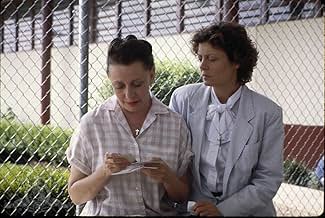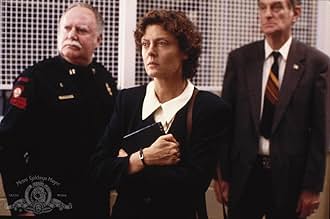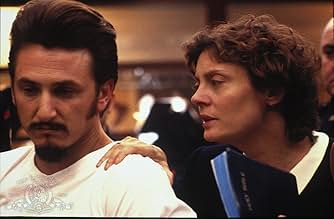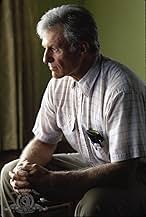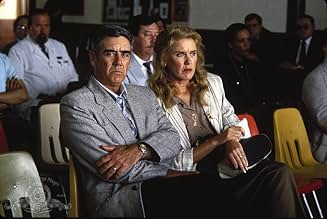Una monja, mientras consuela a un asesino condenado, simpatiza tanto con el asesino como con la familia de la víctima.Una monja, mientras consuela a un asesino condenado, simpatiza tanto con el asesino como con la familia de la víctima.Una monja, mientras consuela a un asesino condenado, simpatiza tanto con el asesino como con la familia de la víctima.
- Ganó 1 premio Óscar
- 23 premios ganados y 25 nominaciones en total
- Dirección
- Guionistas
- Todo el elenco y el equipo
- Producción, taquilla y más en IMDbPro
Argumento
¿Sabías que…?
- TriviaHelen Prejean: The real Sister Helen appears outside the prison during a candlelight vigil scene.
- ErroresThe chemicals used in lethal injections in Louisiana are administered manually, not by a machine as in the movie.
- Citas
Prison Guard: Tell me something, Sister. What is a nun doing in a place like this? Shouldn't you be teaching children? Do you know what this man has done? How he killed them kids?
Sister Helen Prejean: What he was involved with was evil. I don't condone it. I just don't see the sense of killing people to say killing people's wrong.
Prison Guard: You know how the Bible says "an eye for an eye."
Sister Helen Prejean: You know what else the Bible asks for? Death as a punishment for adultery, prostitution, homosexuality, trespass upon sacred ground, profaning the Sabbath, and contempt of parents.
Prison Guard: I ain't gonna get into no Bible quoting with no nun, 'cause I'm gonna lose.
- Créditos curiososIn the heart-shaped symbol at the end of the credits, the initials EMLA, JHR, MGR, and SS stand for Tim Robbins' family with Susan Sarandon (SS) -- Jack Henry Robbins and Miles Guthrie Robbins (their two sons together) and Eva Maria Livia Amurri (Sarandon's daughter with Franco Amurri).
- Bandas sonorasThe Face of Love
Performed by Nusrat Fateh Ali Khan with Eddie Vedder
Written by David Robbins, Tim Robbins & Nusrat Fateh Ali Khan
Nusrat Fateh Ali Khan courtesy of Real World Records, Ltd.
Eddie Vedder courtesy of Epic Records
I read Sr. Helen Prejean's book, upon which this film was based, when it first came out in 1993. At that time I was utterly supportive of capital punishment -- to quote the script, I felt anyone who committed crimes horrible enough to land them on Death Row was an "expendable human being, suckin' up tax dollars." I also had personal experience with the issue when an entire family whom I knew in my childhood were slaughtered by a man who is now on Death Row for his crimes.
As you might imagine, I was disgusted with Sr. Helen's book. I thought that trotting to death row and holding the hand of some scumbag who'd killed innocent people was about the lowest thing anyone could do, and as a Catholic I was offended by the seeming hypocrisy of it.
Because I had disliked the book, I never saw the film until about two weeks ago, when I bought a remaindered copy of it in a video store. I have watched it four times since then, mostly because I am trying to work out my feelings on it. I am still a supporter of capital punishment, but it's going to be less easy for me to ignore the fact that (to quote again), "There's nobody with money on Death Row" -- and quite a few more blacks, now that I think of it, AND the fact that, like Matthew Poncelet's character, the men who are being executed are human beings who have feelings and fears. It's easy to jeer at Matthew on the day before his execution, fretting nervously about whether the lethal injection will "hurt," like a little boy at the doctor's office for a penicillin shot, since his victims' last moments certainly "hurt." What isn't easy is to realize that while the victims of these inmates didn't know they were about to die until it was too late, the inmates themselves have what seems like a blessing at first, but upon deeper examination is the greatest curse: knowing the exact hour and day they will die, and having to face it day by day, hour by hour, minute by minute.
I'm sorry if this review offends people who are sincere death penalty supporters. I still consider myself to be one, but my thinking has been reformed somewhat and I'm more ready to listen to the opponents and try to make compromises; maybe that's what this issue needs more than anything. I will say finally that ONE part of this film did offend me as a Catholic: the symbolic "crucifixion" of Poncelet during the "last words" scene. That was the one place where Robbins strayed from his even-handed approach to the issue -- the only one I could find.
In all, this was a fine film that made me rethink an explosive issue, and I recommend it highly to anyone debating the pros and cons.
- Vibiana
- 25 mar 2000
- Enlace permanente
Selecciones populares
Detalles
- Fecha de lanzamiento
- Países de origen
- Idioma
- También se conoce como
- Dead Man Walking
- Locaciones de filmación
- Productoras
- Ver más créditos de la compañía en IMDbPro
Taquilla
- Presupuesto
- USD 11,000,000 (estimado)
- Total en EE. UU. y Canadá
- USD 39,363,635
- Fin de semana de estreno en EE. UU. y Canadá
- USD 118,266
- 1 ene 1996
- Total a nivel mundial
- USD 39,363,635
- Tiempo de ejecución2 horas 2 minutos
- Color
- Mezcla de sonido
- Relación de aspecto
- 1.85 : 1
Contribuir a esta página



